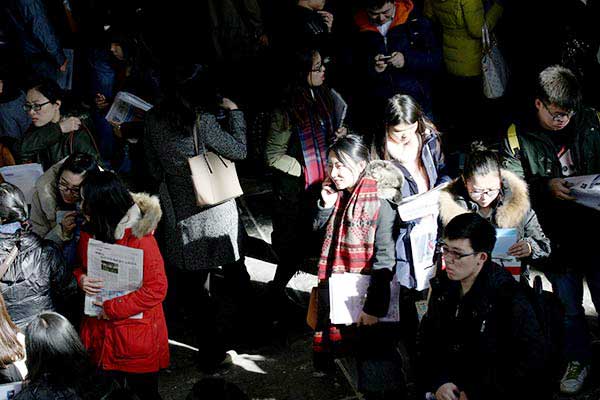
|
|
More than 18,000 positions were provided during a job fair for graduating students in Beijing on Dec 15, 2015. [WANG ZHUANGFEI / CHINA DAILY]
|
Despite heavy smog, skyrocketing house prices and living pressures, China's first-tier cities,including Beijing, Shanghai and Guangzhou, are still the top the choices for the best brains.
At the same time, smaller cities trying to attract high-end talent are facing challenges both inrecruiting and retention.
Zhaopin.com, a Chinese human resources website, released its list of Best Employers for 2015on Friday. It showed that 70 percent of the top 100 best employers are located in first-tier cities.Among them, 40 are located in Beijing, 17 in Shanghai, 10 in Shenzhen and four in Guangzhou,Guangdong province.
"Earlier there were reports showing that job-hoppers favor smaller cities, as they want to escapeBeijing, Shanghai and Guangzhou. This is not true," said Guo Sheng, CEO of Zhaopin. "Themajority of the best talents are not going to stay in third- or even fourth-tier cities. We saw manypeople leaving first-tier cities for all kinds of reasons. But most of them are not talents we aretalking about."
Guo said it is always the advanced and fast-growing industries that require the talent, and thoseare most often located in the bigger cities.
"Take Beijing as an example. It attracts a lot of investment, which will generate a lot ofopportunities that will naturally attract many talents. Industries like the Internet, as well as culturallyinnovative ones, are developing very fast in Beijing, and they bring talents to stay in the city."
However, as urbanization develops in China, the demand for high-end talent, includingforeigners, in smaller cities is also growing and sometimes underestimated.
Pan Yaqun, head of the Anhui provincial Administration of Foreign Experts Affairs, said as aninland province, Anhui is less competitive in overall economic strengths compared with thecountry's more developed coastal areas, while "the need for economic upgrading is probablyequal".
To attract talent, including overseas returnees and foreign experts, smaller cities are introducingpreferential policies such as financial support, housing subsidies and even education solutionsfor the children of prospective workers.
However, Pan said some companies that succeed in finding qualified candidates for industrialupgrades are "lucky", and many other companies haven't found even one qualified candidate fora variety of reasons.
Zhaopin's Guo said part of the reason is the lack of a "mechanism" to support development ofhigh-end industries and projects, such as a mature economic structure and fundraisingenvironment.
"Generally speaking, there are three ways to keep talent£career, salary and incentive policies.And it should start with career, instead of the opposite," Guo said. "Many local governmentsstarted with the incentive policies, but they won't last long."

